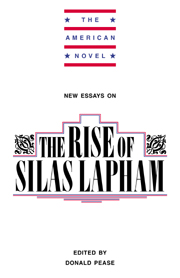Book contents
- Frontmatter
- Contents
- Series Editor's Preface
- 1 Introduction
- 2 Helpless Longing, or, the Lesson of Silas Lapham
- 3 The Hole in Howells / The Lapse in Silas Lapham
- 4 The Economy of Pain: Capitalism, Humanitarianism, and the Realistic Novel
- 5 Smiling through Pain: The Practice of Self in The Rise of Silas Lapham
- 6 The Rise of Silas Lapham: The Business of Morals and Manners
- Notes on Contributors
- Selected Bibliography
1 - Introduction
Published online by Cambridge University Press: 08 January 2010
- Frontmatter
- Contents
- Series Editor's Preface
- 1 Introduction
- 2 Helpless Longing, or, the Lesson of Silas Lapham
- 3 The Hole in Howells / The Lapse in Silas Lapham
- 4 The Economy of Pain: Capitalism, Humanitarianism, and the Realistic Novel
- 5 Smiling through Pain: The Practice of Self in The Rise of Silas Lapham
- 6 The Rise of Silas Lapham: The Business of Morals and Manners
- Notes on Contributors
- Selected Bibliography
Summary
William Dean Howells's reputation as an author was established following the publication in 1885 of The Rise of Silas Lapham. Previously Howells had been acknowledged in literary circles for his several gifts as an editor and entrepreneur able to recognize and promote the literary talents of gifted younger writers. In his critical essays, editor's column, and book reviews Howells set the literary agenda for his generation, admonishing a growing readership not only what books to read but how and for what reasons. He successfully argued the importance for American literature of writers as different as Henry James and Mark Twain, and actively pursued them for contributions to North American Review, Atlantic Monthly, and Harper's Weekly. While the nine novels that preceded The Rise of Silas Lapham were, as a result, usually regarded as efforts clearly subordinate to his editorial work, since 1885 Silas Lapham has held “a special place in the Howells canon,” as Kermit Vanderbilt has recently observed. In these introductory remarks to New Essays on The Rise of Silas Lapham, I am centrally concerned with the literary fortunes of the novel, the loss and subsequent reconstruction of its reputation, and the literary and social movements with which it has been associated.
Both James Russell Lowell, who was the arbiter of literary judgment for Howells's generation, and Henry James, who would set the standard of literary judgment for postwar Americanist critics, found in it ample proof of Howells's literary genius.
- Type
- Chapter
- Information
- New Essays on The Rise of Silas Lapham , pp. 1 - 28Publisher: Cambridge University PressPrint publication year: 1991
- 1
- Cited by



